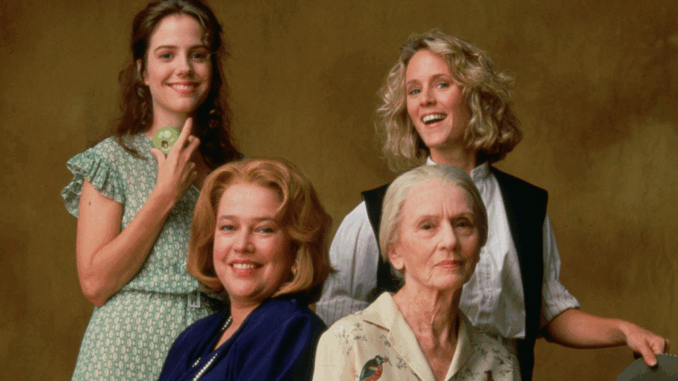
A Timeless Tale of Friendship, Identity, and Courage
Over three decades have passed since Fried Green Tomatoes first hit theaters in December 1991, yet the film’s emotional power and cultural impact continue to captivate audiences around the world. Based on Fannie Flagg’s novel Fried Green Tomatoes at the Whistle Stop Cafe, the film is more than just a Southern period drama—it is a deeply personal story of resilience, chosen family, and the courage to break societal norms.
Directed by Jon Avnet and starring Kathy Bates, Jessica Tandy, Mary Stuart Masterson, and Mary-Louise Parker, the film delicately intertwines two parallel timelines: one set in the 1920s and the other in the 1980s. Its unique structure, heartfelt performances, and subtly radical themes have earned it a place in the hearts of viewers and critics alike.
33 Years Later: The Film’s Cultural Relevance Has Only Grown
As the film turns 33, its themes of female empowerment, queer identity, and the meaning of belonging feel more relevant than ever. In a time when conversations about gender roles, LGBTQ+ visibility, and social justice dominate public discourse, Fried Green Tomatoes quietly reminds us that these issues have always existed—and that they have long been met with quiet rebellion and fierce love.
The film’s portrayal of Idgie Threadgoode (Mary Stuart Masterson) and Ruth Jamison (Mary-Louise Parker) stands as one of the most tender and nuanced relationships in mainstream cinema of the 1990s. Though the film does not explicitly label their bond as romantic, it is evident in both subtext and performance. For many viewers—especially in the LGBTQ+ community—their love was a source of representation long before queer stories became common in Hollywood.
Revisiting the Characters: Complex, Flawed, and Human

One of the reasons Fried Green Tomatoes continues to resonate is the complexity of its characters. Evelyn Couch (Kathy Bates) is a suburban housewife suffocating under the weight of patriarchy and midlife irrelevance. Through her unlikely friendship with the elderly Ninny Threadgoode (Jessica Tandy), she awakens to her own power and purpose. Her transformation is one of the most emotionally satisfying arcs in the film, especially for women who have felt unseen or dismissed.
Ninny, in turn, becomes the soul of the story. Her vivid retellings of Whistle Stop’s history serve as both memory and myth. Whether she truly is Idgie—as many fans still speculate—remains a poignant mystery that underscores the film’s themes of identity and storytelling.
Idgie herself is a marvel of nonconformity. Rebellious, wild, fiercely loyal, and unapologetically herself, she defies the gender expectations of her era. Whether she’s jumping from trains, running a café, or standing up against racist injustice, she represents the spirit of quiet revolution. Ruth, more reserved and deeply religious, is her opposite in many ways, yet together they create a bond that transcends social rules and norms.
A Southern Story With a Radical Heart
While Fried Green Tomatoes is drenched in the rich aesthetics of the American South—complete with fried foods, slow accents, and small-town gossip—it refuses to romanticize its past. Racism, sexism, and domestic violence are addressed head-on. The storyline involving Big George and the murder of Frank Bennett, Ruth’s abusive husband, brings racial tension to the surface while also hinting at themes of vigilante justice and moral ambiguity.
The film manages to balance its charm and sweetness with real moments of darkness and pain. That emotional layering gives it a depth that many period dramas lack. Rather than offering a sanitized vision of Southern life, it shows the hardships and the quiet defiance that defined the lives of so many.
Women Behind and In Front of the Camera
Though directed by a man, Jon Avnet, Fried Green Tomatoes owes much of its soul to its female creators and performers. Fannie Flagg’s novel laid the groundwork for a story that celebrates women’s resilience and the power of female relationships. The screenplay, co-written by Flagg and Carol Sobieski, captures the emotional nuance of the source material while adjusting it for the screen with grace.
Jessica Tandy, who won an Academy Award for Driving Miss Daisy just two years earlier, brings wisdom and mischief to Ninny. Kathy Bates, then on the rise after her Oscar-winning role in Misery, turns Evelyn into a figure of both humor and heartbreak. And Mary Stuart Masterson and Mary-Louise Parker give magnetic performances as two women forging a life on their own terms.
Awards, Legacy, and Continued Fan Devotion
Upon release, Fried Green Tomatoes was both a critical and commercial success. It earned two Academy Award nominations—for Best Supporting Actress (Jessica Tandy) and Best Adapted Screenplay (Fannie Flagg and Carol Sobieski). Though it didn’t take home the Oscar, it found lasting victory in the devotion of its audience.
The film has developed a cult following that spans generations. Fans continue to discuss its themes, analyze its subtext, and revisit their favorite scenes. Whether it’s the “Towanda!” moment of female rage or the heartbreaking farewell between Ruth and Idgie, Fried Green Tomatoes delivers moments that linger in memory.
Today, you’ll find merchandise, memes, social media fan pages, and even guided tours to the real Whistle Stop Café in Juliette, Georgia. The café, transformed into a tourist destination after the film’s release, still serves fried green tomatoes and draws fans from around the globe.
Looking Ahead: Could a Revival Be Possible?
With the rise of legacy sequels and reboots, many fans have wondered if Fried Green Tomatoes might return to the screen. In fact, in 2020, NBC announced a television adaptation in development with Reba McEntire attached as both producer and star. The series was expected to follow a modernized continuation of the Whistle Stop story, though updates have been scarce since.
Whether or not the show ever comes to fruition, the desire for more of the world that Fried Green Tomatoes built speaks volumes about its enduring relevance. At a time when so many films come and go, its staying power feels miraculous—and deeply earned.
Conclusion: A Story That Refuses to Fade
In a world that often undervalues women’s stories—especially those about friendship, aging, love outside the norm, and small-town resilience—Fried Green Tomatoes remains a beacon. It tells us that our histories matter, even the quiet ones. That love doesn’t always fit into boxes. And that courage can look like kindness, loyalty, and the refusal to walk away from those we love.
Thirty-three years after its release, Fried Green Tomatoes is not just a film—it is a legacy. One that continues to grow, inspire, and challenge what we think we know about Southern stories, about women, and about ourselves.
